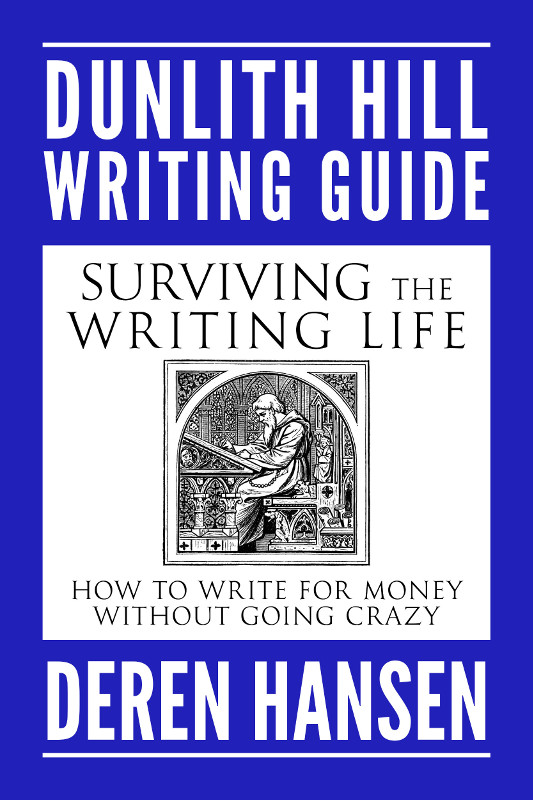
Description
Like real life, the writing life is filled with contradictions and perplexities. The world of commercial publishing is counter-intuitive and writers dive in weighed down with misconceptions, delusions, and unrealistic expectations.
Perhaps because most of us write in some form every day we believe we can—and should—write a book. We also assume writing is the hard part and once our manuscript is finished publishers will line up for the privilege of delivering it to the world. This is why many people who say they want to write really mean they want to have written.
This volume offers a sober perspective on the writing life: what writing for money is really about and what you need to be prepared to do in order to endure its rigors. Once you understand what’s actually going on, you’ll be able to steer a clear-headed course as you participate in the great conversation. And you’ll come out the other side with your sanity—and dreams—intact.
Purchase
Chapter 1: Hard Questions and Sober Answers
You want to be a writer?
Ok, you’re a writer.
Like ants, which live in an exquisitely complex world of chemical signals, we exist simultaneously in the physical world and a universe filled with streams of encoded symbols. If we define writing as assembling strings of symbols in some medium—lists, notes, messages, letters, email, presentations, reports, and so on—almost everyone in the literate world writes.
The fact that you have this book means that you are thoroughly a part of the literate world, and thus are a writer.
“No,” you say, “I want to be a writer.”
Ah, you mean you want other people to call you a writer.
It is true that while almost all of us write, very few of us are called or call ourselves writers. That’s because writers produce a particular kind of writing: work that is consumed by people in general instead of someone in particular.
Implicit in the dream of being a writer is the hope that you will derive some or all of your livelihood from your writing. That is, being a writer is often synonymous with writing for money.
If you’ve ever entertained such a dream, this book is for you because it will help you explore two critical questions:
- Why should perfect strangers trade their money for your words?
- Are you willing to do what it takes to produce the kind of words strangers will want to buy?
Why do you want to be a writer?
People who say they want to write a book usually mean they want to publish a book. They take it as given that the book they produce will naturally have publishers bidding for the privilege of publishing it and readers lining up at the book stores to purchase it.
Why?
Because they wrote it: because they brought a prodigy into the world for which future generations will sing their praise.
Does that sound a bit over the top?
Think about it: does anyone set out to write a mediocre book? Does anyone dream of their book debuting to lackluster sales?
Publishing in the commercial market is a trying and exhausting undertaking. Yet I’ve met far more people who want to be published than want to release an album or play professional sports, even though the requirements for success in all three endeavors are similar. Like many things that take skill and dedication, writing at a professional level is not as easy as it looks.
So, why do lots of people believe they should be published?
- Many confuse a passion for reading with a need to write.
- A number think that because they can write they should write.
- Some want to prove they can write something better than the stuff that’s out there.
- Some who can write fall prey to the, “cute kid,” syndrome and assume everyone will love their baby as much as they do.
- Others who say they dream of writing really dream of having written so they can bask in the glow of their accomplishment.
On the Ultimate Goal of Publication
Many would-be writers talk about the journey toward their ultimate goal of publication—as if writing is a sort of personal quest and publication is the Holy Grail. What’s odd about this ultimate goal is that publication, in some form, is easier now than it ever was: if your quest is simply to publish, there are a variety of ways to achieve it that don’t require agents and major New York publishing houses.
Of course, what we don’t want to admit when we talk about our writing journey toward publication is that our goal is really vindication: we want the stamp of approval from the gatekeepers (agents, editors, and publishers) which will admit us into the ranks of the published authors and make us citizens of the shining literary city on the hill.
It is true that the personal experience of producing a novel is much like a journey. And it’s perfectly understandable that we should want our largely solitary pursuits validated by other people. But the stark reality is that the publishing industry doesn’t exist to bolster your self-esteem or even acknowledge your worth. The only thing that matters is whether you have a project that will appeal to an audience large enough to be profitable.
Why should you publish?
With the advent of the Internet, there are more ways to share one’s writing with others than ever before. You can publish anything you want, from the profound to the profane, in a multitude of formats—and many people already have.
Combine the exponential eruption of new material with the wholesale loading of everything that’s ever been written onto the Internet and we have a situation where you wouldn’t make a significant dent in the list of things to read even if you had a thousand lifetimes.
Why should you add a few drops to this rising ocean of information?
You might argue everyone has a right to express themselves.
Perhaps, but no one else has any obligation to pay any attention to that expression.
This brings us to the crux of the matter.
Writing for money isn’t about you
If you intend to write for a general audience, the vast majority will neither know nor care about you and your reasons for writing. The only thing that matters to your readers, and the only reason they’ll give you money for your words, is that your book gives them something—an experience or information—they can’t get somewhere else or as conveniently.
If you understand this one fundamental truth about commercial writing, you’ll be well ahead of the legions of would-be writers.
* * *
So what should be your motive for writing?
At one level there are as many answers as writers, but after you peel away motives like vanity and fame that can’t endure the grueling course that is the life of writing, the only sustainable answer is that you write because you must.
Most people understand, “you write because you must,”as a compulsion—which seems obvious when we’re talking about the dedicated time and effort required to produce a hundred thousand words. But the compulsion to write is not a nameless force bubbling up from our subconscious. The answer we arrive at in the final chapter is that the reason to write is because you have something to contribute to the conversation.
In order to understand what that means and what you’re getting yourself into, we’ll begin in chapter 2 with a look at the stamina, dedication, and self-confidence required if you want to write for a general audience. Chapters 3 and 4 explore the world of commercial publishing and your role in it as a writer. After an interlude in chapter 5 to help you understand how to make sense of the wealth of writing advice you’re likely to encounter, we’ll turn in chapter 6 to the mindset you’ll need to develop to survive the writing life. In chapters 7 and 8 we elaborate the ways you can provide value to your reader when you understand your job as a writer and take a closer look at what constitutes good writing. And then bring it all together in chapter 9 with a discussion of the ways in which you can contribute to the great conversation embodied in our written legacy.
This volume also includes a pair of appendices that explore the changes in commercial publishing brought about by the eBooks revolution and suggest a strategy for participating in the e-Publishing revolution.
None of this, of course, will guarantee you fame and fortune as an author. But then no book can—not even the ones that say they do. What it will do is give you the tools, in the form of concepts, expectations, and mindsets, to chart your own course through the seas of commercial publishing without going crazy.
Table of Contents
1: Hard Questions and Sober Answers |
||
2: Not for the Faint of Heart |
||
3: The World of Commercial Publishing |
||
4: Your Role as a Commercial Writer |
||
5: Writing Advice |
||
6: Surviving the Writing Life |
||
7: Your Job as a Writer |
||
8: Good Writing |
||
9: The Great Conversation |
||
10: Coda |
About the Author
Deren Hansen
Trained as an anthropologist, engineer, and historian, Deren Hansen brings a unique structural perspective to the conversation about writing and the writing life.





